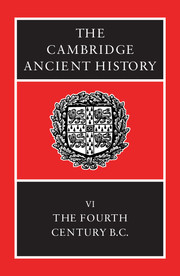Book contents
- Frontmatter
- 1 Sources and their uses
- 2 Sparta as victor
- 3 Persia
- 4 The Corinthian War
- 5 Sicily, 413–368 B.C.
- 6 The King's Peace and the Second Athenian Confederacy
- 7 Thebes in the 360s B.C.
- 8 Regional surveys I: Persian lands and neighbours
- 9 Regional surveys II: the West and North
- 10 Society and economy
- 11 The polis and the alternatives
- 12 Greek culture and science
- 13 Dion and Timoleon
- 14 Macedon and north-west Greece
- 15 Macedonian hegemony created
- 16 Alexander the Great Part 1: The events of the reign
- 17 Alexander the Great Part 2: Greece and the conquered territories
- 18 Epilogue
- Chronological Table
- BIBLIOGRAPHY
- Index
- Map 1: Greece and Western Asia Minor
- Map 9: Egypt
- Map 20: Alexanders campaigns
- References
11 - The polis and the alternatives
Published online by Cambridge University Press: 28 March 2008
- Frontmatter
- 1 Sources and their uses
- 2 Sparta as victor
- 3 Persia
- 4 The Corinthian War
- 5 Sicily, 413–368 B.C.
- 6 The King's Peace and the Second Athenian Confederacy
- 7 Thebes in the 360s B.C.
- 8 Regional surveys I: Persian lands and neighbours
- 9 Regional surveys II: the West and North
- 10 Society and economy
- 11 The polis and the alternatives
- 12 Greek culture and science
- 13 Dion and Timoleon
- 14 Macedon and north-west Greece
- 15 Macedonian hegemony created
- 16 Alexander the Great Part 1: The events of the reign
- 17 Alexander the Great Part 2: Greece and the conquered territories
- 18 Epilogue
- Chronological Table
- BIBLIOGRAPHY
- Index
- Map 1: Greece and Western Asia Minor
- Map 9: Egypt
- Map 20: Alexanders campaigns
- References
Summary
FOURTH-CENTURY ATHENS: THE MACHINERY OF GOVERNMENT
Formally, Athens had the same constitution from the tribal reorganization of Cleisthenes in 508/7, or at any rate from the reform of the Areopagus by Ephialtes in 462/1, until the suppression of the democracy by Antipater at the end of 322/1: the oligarchies of 411–410 and 404/3 were brief interruptions, each ending with the restoration of the democracy. The working of this democracy in the time of Pericles has been described in the previous volume. Decisions, on both domestic and external matters, were taken by an assembly of adult male citizens, which by the end of the fifth century had forty regular meetings a year: all topics on which the Assembly pronounced had first to be discussed by the Council of 500, and there were other safeguards by which the Assembly was limited, but any member could propose motions or amendments, or speak in the debate, and decisions were taken by a simple majority. It was not possible for all the citizens to be involved simultaneously in carrying out decisions, as they were all involved simultaneously in making them, but it was possible for them all to be involved in turn. The administration of the democracy was based on a large number of separate boards, usually comprising one man from each of the ten tribes, appointed by lot for one year and not eligible for reappointment to the same board; the scope for competence or incompetence was slight, and the conscientious citizen would serve on several of these boards in the course of his life.
- Type
- Chapter
- Information
- The Cambridge Ancient History , pp. 565 - 591Publisher: Cambridge University PressPrint publication year: 1994
References
- 3
- Cited by



